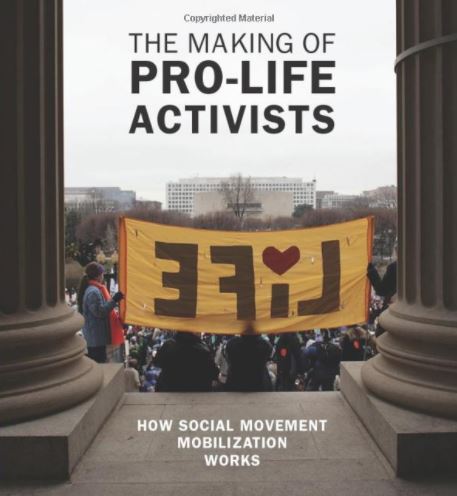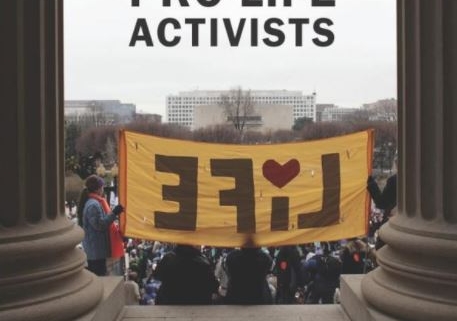The Pro-Life Movement Belongs to All of Us
[Today’s guest post is by K. Misener.]
I recently became aware of a book which looks at the pro-life movement from an academic perspective – “The Making of Pro-Life Activists: How Social Movement Mobilization Works” by sociology professor Ziad Munson. In contrast to the common stereotype that pro-lifers are all part of some unified conservative Christian agenda, Munson asserts that the pro-life movement is actually not a monolithic movement with one single cohesive world view. He points out that, even though religion is heavily represented in the American pro-life movement, many of our religious pro-life allies are split between two groups that are traditionally often at odds at each other – Catholics versus Protestant evangelicals. Just as in American society as a whole there is a spectrum of belief despite many Americans identifying as Christian, so too the pro-life movement contains a spectrum of beliefs even though we have a vocal Christian component.

Personally, I have always found ample reasons to be pro-life without any religious reason being a factor. One formative experience in developing my pro-life view came when I saw photographs of developing embryos in my college biology textbook – and I noticed that the textbook’s photos matched up with the photos that I had seen pro-lifers distributing. I also noticed that many abortion advocates are content to dismiss these photos by calling them “Fake” and just leave it at that, instead of distributing accurate fetal development photos themselves or encouraging women considering abortion to look at the ultrasound. If the facts are on the pro-choice side and pro-lifers are just religious fanatics exaggerating the fetus’s development, why wouldn’t pro-choicers want people to see the truth about fetal development with their own eyes?
Religious groups have a long history of being significant forces in social movements. I think one reason this happens is because a church congregation offers an easy way to organize and mobilize people who share a similar worldview. As a general rule, pro-life atheists and agnostics do not have this sort of network of like-minded people as easily available as churchgoers do – indeed, some atheists and agnostics consider one of the fringe benefits of non-belief to be that you do not have any obligation to attend weekly meetings to affirm your non-belief! This has the effect that you will often see churches chartering buses to the March for Life and word will spread through congregations about events like 40 Days for Life, while pro-life atheists at this point are still in the process of finding each other through groups such as Secular Pro-Life.
Surely the existence of prominent religious activists such as William Wilberforce, Dorothy Day, and Martin Luther King Jr. does not detract in any way from the fact that many non-religious people also are active in causes such as human rights, racial equality, or peace issues. More recently, I look at the example of Father Daniel Berrigan, a Jesuit priest who has tirelessly worked to promote peace (on issues such as the Vietnam war, the death penalty, euthanasia and – yes – abortion) despite being arrested numerous times for civil disobedience. I do not think that most people would say that the presence of religious people such as Fr. Berrigan in the peace movement means that all peace activists are “religious fanatics”.
I think those of us who are non-religious pro-lifers should respect the contributions that religious pro-lifers have made to our cause, but we also should not wait for religious pro-lifers to roll out the welcome mat for us before we become active in the pro-life movement ourselves. Just as in the general population some people still hold prejudiced views about atheists and agnostics, there are still some pro-lifers who do not understand how someone can be an atheist and still be a “good person”. That’s really beside the point, however. The pro-life movement is not the personal property of any particular group. The pro-life movement belongs to all of us. Just as “wantedness” does not determine if a fetus deserves to live or die, how “wanted” you are by other activists does not determine your right to be present in this movement. If your efforts save a life that otherwise would not have been saved, does it really matter what anyone else thinks?
If you appreciate our work and would like to help, one of the most effective ways to do so is to become a monthly donor. You can also give a one time donation here or volunteer with us here.


Love your last paragraph. So true.
I actually didn't realize being accepted by religious groups was an issue for secular pro lifers. Religious groups actually make me uncomfortable because they seem to have to insert "God" or "bible" into every pro life piece of info. Even if their info is correct, it makes it seem less valid because religion is in the forefront.(NO disrespect to religion meant at all) While I may know their info is also based on science, others might not which is the problem for me. When discussing a bit of info I heard from a religious site, I have to stress that I know it to be true despite the fact that the place I obtained it from is religious, or cite a non religious site that also supports the info. Just feels like it makes it more difficult to validate pro life facts and justify the position. I whole heartily agree we should respect the contribution of religious pro life groups , but I personally was never concerned about being accepted by them.
I am incredibly grateful to groups like Secular Pro-Life, because (a) even as a Christian pro-lifer, I often find religious pro-life groups over-saturate their arguments with religious commentary that is meaningless to a non-religious pro-choicer, and (b) groups like this one offer a ready and meaningful defense to those with the mind-set that all pro-lifers are religious and have primarily religious-based reasons for their pro-life position.
Even though my religious beliefs do contribute to the foundation for my pro-life position, I still build my position on science and medicine, and it's refreshing to be able to follow groups that do the same.
Great Post!
I do understand that some religious pro-life groups have to "tone down" the religious aspect. I was given questioning looks for getting excited over the pro-gay/pro-life banner at the March for life in DC. Just because I don't agree with a lifestyle choice doesn't me I reject people. Many people don't agree with or understand my lifestyle choice either.
I believe we are here to seek the truth and do the good. Those things never change.
As a pro-life Hindu who sometimes feels like I don't quite belong ANYWHERE within this movement…I really appreciate this post. This movement really is for all of us.
Great essay. I am Christian but agree 100% with what you say.
You are right.
I'm a pro-life Christian. I applaud you, stand beside you and appreciate you, all of you.
Active Mormon here. I would be actively pro life whether I was a member of a religious faith or not. I participate in regular pro life activities in my area. I am willing to stand with whoever is standing for life – and (if prayers are being conducted), I will pray with whoever is praying.
I am not a pro-life atheist but I appreciate the existence of secular pro-lifers. I don't get along well with other religious pro-lifers since I have no interest in converting to their beliefs.